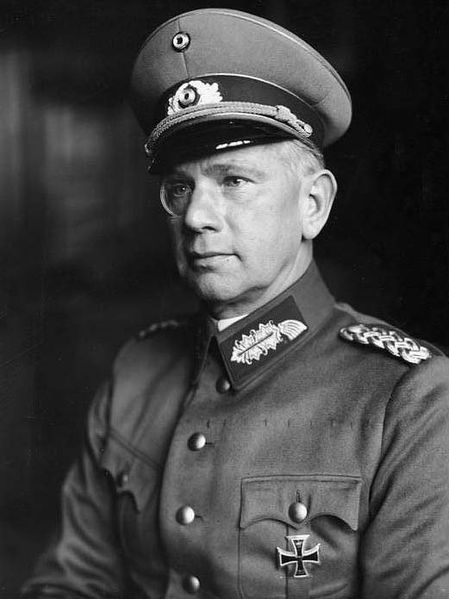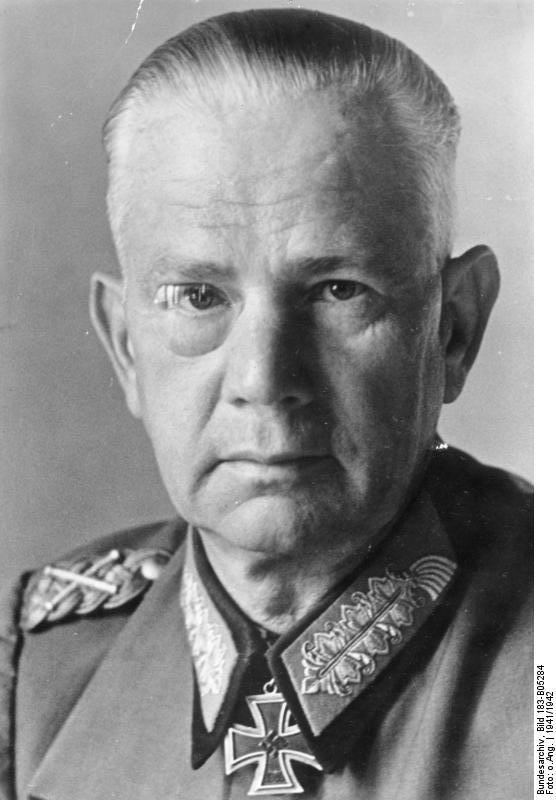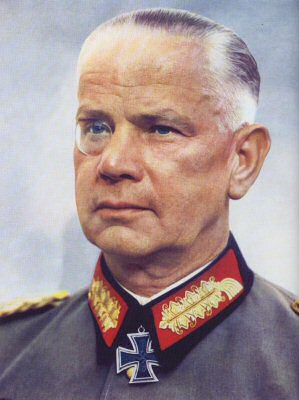<Back to Index>
- Mathematician Hans Arnold Heilbronn, 1908
- Architect Alexey Victorovich Shchusev, 1873
- General Field Marshal Walther von Reichenau, 1884
PAGE SPONSOR



Walter von Reichenau (8 October 1884 – 17 January 1942) was a German Generalfeldmarschall during World War II.
Reichenau was born in Karlsruhe to a Prussian general and joined the German Army in 1903. During World War I he served on the Western Front. He was awarded the Iron Cross First Class and by 1918 had been promoted to the rank of captain.
Reichenau stayed in the army under the Weimar Republic as a General Staff officer. From 1931 he was Chief of Staff to the Inspector of Signals at the Reichswehr Ministry, and later served with General Werner von Blomberg in East Prussia. His uncle, an ardent Nazi, introduced him to Adolf Hitler in 1932 and von Reichenau became a convert, joining the Nazi Party soon after. Doing so was a violation of army regulations, which forbade army members from joining political parties.
Reichenau's family was quite wealthy, descended from a long line of German nobility. Throughout the nineteenth and early twentieth centuries the von Reichenau family owned and operated one of the largest furniture factories in Germany. In 1938, records indicate, the family donated the factory to the Nazi cause, transforming it into a munitions plant. During Allied attacks in 1945, the factory (located just outside Karlsruhe, Germany) was destroyed in an air raid, the last remaining vestiges of the von Reichenau family's wealth and prominence obliterated in the process.
He was married to Alix, daughter of Silesian Count Andreas von Maltzan. During the war, Alix's sister Maria (Marushka) hid her Jewish lover Hans Hirschel (from the Gestapo) in her Berlin apartment; von Reichenau knew this, and visited them there. Maria also worked to hide underground Jews and political dissidents, sustain them, or help them escape from Germany.
When Hitler came to power in January 1933, Blomberg became Minister of War and von Reichenau was appointed head of the Ministerial Office, acting as liaison officer between the Army and the Nazi Party. He played a leading role in persuading Nazi leaders such as Hermann Göring and Heinrich Himmler that the power of Ernst Röhm and the SA must be broken if the Army was to support the Nazi regime. This led directly to the "Night of the Long Knives" of 30 June 1934.
In 1935 von Reichenau was promoted to major general (generalleutnant) and was appointed Commander in Munich. By 1938, after the Blomberg - Fritsch Affair in which General Werner von Fritsch was forced out of the Army command, von Reichenau was Hitler's first choice to succeed him, but older leaders such as Gerd von Rundstedt and Ludwig Beck refused to serve under him, and Hitler backed down. Von Reichenau's enthusiastic Nazism repelled many of the generals who would not oppose Hitler but who did not care for the Nazi ideology.
In September 1939, von Reichenau commanded the 10th Army during the invasion of Poland. In 1940 he led the 6th Army during the invasion of Belgium and France, and in July Hitler promoted him to field marshal. During the June 1941 invasion of the Soviet Union, von Reichenau again commanded the 6th Army, which captured Kiev and Kharkov. During the offensive, Reichenau inspected every single Russian tank he
came across. He would enter each tank and, using a ruler, he would
examine the thickness of the armor. Upon examining a T-34 tank, he told his officers, "If the Russians ever produce this tank on an assembly line, we will have lost the war." Politically, von Reichenau was an anti - Semite who
equated Jewry with Bolshevism and the perceived Asian threat to Europe.
The infamous October 1941 "Reichenau Order" paved the way for mass
murder by instructing the officers thus: "In
this eastern theatre, the soldier is not only a man fighting in
accordance with the rules of the art of war... For this reason the
soldier must learn fully to appreciate the necessity for the severe but
just retribution that must be meted out to the subhuman species of
Jewry...". All Jews were henceforth to be treated as de facto partisans, and commanders were directed that they be either summarily shot or handed over to the Einsatzgruppen execution squads of the SS-Totenkopfverbände as the situation dictated. Upon hearing of the Severity Order, Reichenau's superior Field Marshal Gerd von Rundstedt expressed
"complete agreement" with it, and sent out a circular to all of the
Army generals under his command urging them to send out their own
versions of the Severity Order, which would impress upon the troops the
need to exterminate Jews. A few historians such as Walter Görlitz have in vain sought to defend von Reichenau, summarizing the above order as
"demanding that the troops keep their distance from the Russian
civilian population." Reichenau supported the work of the SS Einsatzgruppen in exterminating the Jews in the occupied Soviet territories. He
was specifically responsible for the cold blooded killing of ninety
Jewish orphans in Belaja Zeerkow and was an accessory to the mass murder of Babi Yar near Kiev, both in 1941. On 19 December 1941 Hitler sacked Walther von Brauchitsch as
Commander - in - Chief and tried to appoint von Reichenau to the post. But
again the senior Army leaders rejected von Reichenau as being "too
political" and Hitler appointed himself instead.
In January 1942 von Reichenau suffered a cerebral hemorrhage, and it was decided to fly him from Poltava to a hospital in Leipzig, Germany. He is often said to have been killed in a plane crash in Russia,
though Görlitz writes that the plane merely made an emergency
landing in a field, and that von Reichenau actually died of a heart
attack. His death coincided in time with a propaganda action conducted
by the Polish underground (Operation Reichenau),
whose goal was to discredit Reichenau, in the eyes of the German
leadership, as a person who allegedly had been plotting to overthrow
the Nazi régime, to sow distrust between the Nazi political
leadership and its military command, and punish one of the German
generals responsible for war crimes in Poland. This coincidence became
a fertile ground for conspiracy theories, which allege that Reichenau
might actually have been killed by the Nazi secret services.